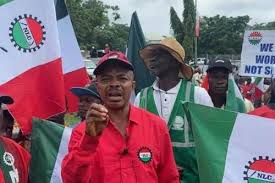The Nigeria Labour Congress (NLC) has directed workers in states that have not commenced implementing the new minimum wage to embark on an indefinite strike from December 1, 2024.
This decision follows the NLC’s National Executive Council (NEC) meeting held over the weekend, where frustration over certain states’ non-compliance with the 2024 National Minimum Wage Act reached a tipping point.
In a strongly worded communique, the NLC condemned the delays by some state governments, describing their refusal to pay the updated wage as both a legal and moral betrayal. “The NEC notes with deep frustration the persistent delay and outright refusal by some state governments to implement the 2024 National Minimum Wage Act,” the statement read, highlighting the growing hardship faced by workers denied fair compensation.
The NLC announced that it would establish a National Minimum Wage Implementation Committee to monitor compliance and organize nationwide awareness campaigns to educate workers and citizens on the importance of upholding wage laws. In addition, the NLC vowed to initiate a series of industrial actions in all non-compliant states until every state meets the new wage requirements.
“To this end, all state Councils where the National Minimum Wage has not been fully implemented by the last day of November 2024 have been directed to proceed on strike beginning from the 1st day of December, 2024,” the NLC declared, calling it a fight for justice for Nigerian workers.
The NLC also expressed mounting concern over the pricing of petrol (PMS) in Nigeria, pointing to a potential “gang-up” by industry players to artificially inflate prices. They cited ongoing disputes between marketers and the Dangote Group as evidence of pricing irregularities and called for an end to cost-padding and excessive profit margins.
“It is entirely possible that Nigerian workers and masses are being ripped off by those who control the levers of economic power in Nigeria,” the NLC warned, adding that they suspect economic barriers might be intentionally stalling the activation of public refineries. They urged the government to prioritize the reopening of domestic refineries in Port Harcourt, Warri, and Kaduna to curb the industry’s monopolistic tendencies.
The NLC concluded by calling on the Federal Government to introduce substantial measures, rather than symbolic gestures, to relieve the economic burden on Nigerian workers.
The directive from the NLC signals potential widespread disruptions across the country beginning in December if the affected states fail to implement the minimum wage in time, setting the stage for a showdown between labor unions and state governments.




























